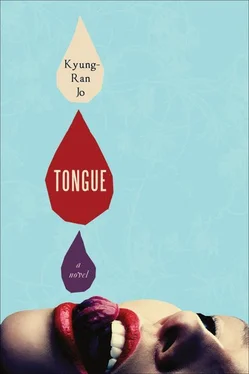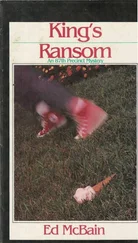A heavy weight presses down on me, all the way down to my uvula. I nod, once. Cold beef topped with a salad of mushrooms, pickle, onion, tomato, oh, and this is Camembert, and you’ve spread whole-seed mustard on the bread . I gulp down the sandwich, watching Chef walk back into the kitchen. He rarely makes snacks himself, usually just grabbing a banana or an orange, sometimes downing a cup of coffee in place of a meal. You haven’t changed a bit, I think as I swallow the sandwich he made for me. And really, this is so big and delicious .
I CATCH A GLIMPSE of Mun-ju walking up the stairs, wearing a dark chive-green coat. It’s the first time I’ve seen her since she came to my place last month to make me porridge. I’m glad it’s her. Ever since I’ve been back at Nove, people I know come in unexpectedly, order food, and call me to the table and pour me a glass of wine after the meal. Won’s Kitchen must have been more famous than I’d realized. Avoiding their sympathetic glances that transmit How are you? I know it must be hard , I carefully empty the wineglass and send out dessert on the house, something like black-rice ice cream or lemon sherbet. When a cook sends out dessert on the house, something you didn’t even order, it has one of two meanings—This is really delicious, please try it and marvel at my work, or Please get up from the table. These days when I send out dessert—its etymology being “clear the table”—the latter is what I’m trying to convey. There’s a saying: You don’t give sour fruit to a sick person.
Mun-ju, who’s holding the menu like a book, orders onion soup and abalone risotto in a tone of voice that indicates, I don’t have an appetite, but I guess I should get something, right? and pushes the menu away. She still doesn’t meet my eyes.
I say, “It’s after nine thirty. The kitchen’s closed.”
“Well, good. Now that I see you, I don’t want to eat anything.”
“Why not?”
“What is this? You look like you’re starving.”
I leak a smile despite myself—even though I’ve lost weight, it can’t be that bad. I go back into the kitchen, entrust her order to Choi, the most junior prep cook, and bring out a basket of herb-and-garlic bread baked earlier this morning. Mun-ju likes to eat more bread than the actual meal and prefers nonalcoholic drinks like tea, coffee, or cocoa to liquor. Even at Won’s Kitchen, she attended only the Bread and Cooking class that I conducted on the weekends. A basket brimming with warm bread is the most effective cure for the hungry, the dissatisfied, or the worried.
Mun-ju and I are still avoiding each other’s gazes, pressing down on the crust with our fingertips or brushing off the crumbs in front of our bread plates with our palms. I wish I could just say it’s all history. I want to tell her she shouldn’t blame herself for everything that’s happened to me. Because it really isn’t her fault.
I met Mun-ju the day a magazine was supposed to come to the restaurant for a shoot. It was a food magazine, and there was a column in which leading French, Italian, and Korean restaurants presented a recipe made with the ingredient of the month, spinach. At Nove, the most famous dish was Chef’s roasted duck breast topped with roots of baby spinach. I was shucking oysters for dinner service when Chef popped in and said, Why don’t you try your hand at it? and left. It was one hour before the shoot. I was nervous even though it wasn’t a special guest coming for a tasting—it was only a picture. It could have been Chef’s way of testing me, Chef who taught me everything I know, everything down to how to hold a knife. This might have been the chance to show him that I not only understood the recipe, but also his—my mentor’s—palate. The inside of my mouth was practically burning with my desperate eagerness to make a roasted duck breast topped with roots of baby spinach that Chef would approve of, one that wouldn’t merely look good for a picture but would make you salivate by just looking at it. I started to wash my hands but paused to pop a shucked, slippery, wet oyster into my mouth.
Spinach, with its brilliant color and subtle fragrance, goes well in vegetable dishes, but it’s primarily used in meat dishes because of its vividness. Only two people I know use the entire vegetable, including the roots—Grandmother and Chef. When I parboiled spinach in salted water, squeezed out excess moisture, melted butter in a pan, sautéed the spinach on low heat, added salt, pepper, raisins, and plated it, Grandmother would say, You’ve made a snooty dish! And she’d eat it happily. But spinach is best the way Grandmother made it, parboiled in salted water and seasoned with garlic, salt, and sesame oil, using your hands. Chef removes only the outer leaves and the rough parts of the roots, doesn’t cut it, and puts the whole thing into a steamer for a light steam. He seasons it only with a sprinkling of coarse sea salt, and the leaves are refreshing and the roots taste a little piquant. Its crunch goes well with the duck breast, marinated in the juices of pressed spinach, seared on the grill over high heat. The lasting flavor isn’t the overpowering taste of a large cut of meat but the snap and sharpness of the baby spinach root. But if you’re used to sweetness, it’s hard to enjoy the bland and light taste of the spinach.
I carefully carried the large white oval plate with the roasted duck breast topped with baby spinach roots like it was a precious pot and put it on the table where the photographer and reporter were sitting—the reporter wearing a short bob with straight bangs, large gold rings dangling from her ears. Of all the tables by the window, it was the table that received the best natural light. Even without additional light, the brown duck and the light-green spinach would look brilliant.
I waited behind the restaurant, leaning on the metal staircase, facing the entrance. I saw the reporter and the photographer push through the glass doors and go down the stairs much earlier than I’d expected. I went inside, bewildered. The white plate was sitting on the table by the window like a still life, its contents untouched. I ran out the door and down the stairs.
“Wait!” I sprinted up to their car, which hadn’t yet left the parking lot, and tapped the car door with my palm. The photographer, who was loading his equipment in the trunk, stuck his head out to see what was going on.
“Look!”
The reporter lowered the window from the passenger side. She looked up at me, eyes questioning.
“You can’t just take a picture and leave!”
“What?”
“How can you write an article without tasting the food?” I protested, as if I were about to fling open the door and drag her out.
She got out unwillingly and asked me sharply, “So you’re saying I have to eat it? Right now?”
I didn’t answer. I hadn’t planned on doing this. But if I cooked something and nobody ate it, I read that to mean they were contemptuous of me. And I’d only met this woman today. I turned around, disappointed.
“Oh, wait, you’re totally serious?” She grabbed my arm and looked me in the eyes. She burst out in sudden laughter.
That was Yeo Mun-ju, my friend sitting across the table right now. Cooking and Wine , the magazine where Mun-ju worked, was the first magazine to run a feature on my food. Later, she was the one who suggested I open a cooking school.
“Did you meet your deadline?” I ask.
“Not yet. I think I will tomorrow.”
“You must be tired. Eat, eat.”
Mun-ju reluctantly dabs a piece of bread in oil and puts it into her mouth. I’d forgotten that it’s the busiest time of the month for her. The magazine is only a five-minute walk from the restaurant. After that first shoot, their deadlines met, Mun-ju brought a horde of her coworkers even after the kitchen was closed, asking me to make some pasta or cold mixed noodles. I gladly cooked for her and her coworkers and uncorked the wine. It was before we’d become close, when the air between us was filled with curious and nervous tension, the days before we turned thirty.
Читать дальше












